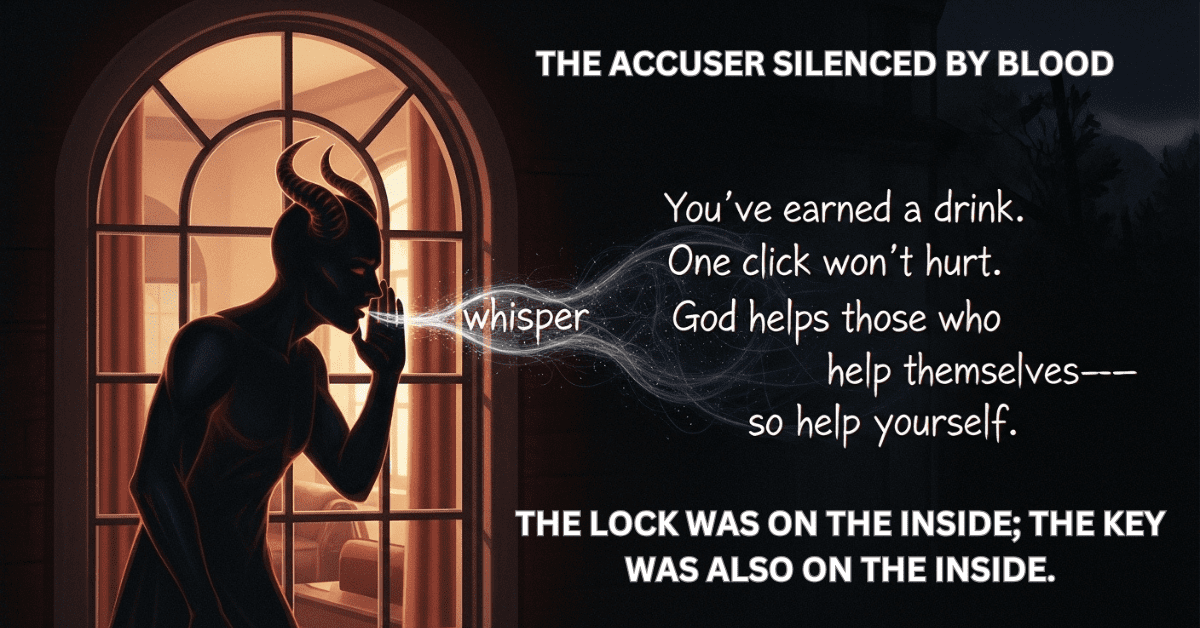Have you ever felt like your own thoughts were a prison? Like the voice inside your head wasn’t really yours, but a cruel imitation?
The Accuser Silenced by Blood
“In reality the lock is on the inside, but the key is also on the inside: ‘He who is in you is greater than he who is in the world.’ The Spirit’s new-suggestion—‘You are My child, not a slave’—is the only voice strong enough to snap the chain at the first link.”
––––––––––––––––––––––––––––
I. The Whisper That Sounds Like You
Every trap begins as a suggestion, not a seizure.
Satan cannot kick the door of the will off its hinges; he is a trespasser without a key. What he can do is lean against the window and whisper a line that rhymes with your own hunger:
“You’ve earned a drink.” “One click won’t hurt.” “God helps those who help themselves—so help yourself.”
The first time you hear it, the voice is obviously outside. The second time it is plausible. The hundredth time it speaks in first-person singular:
“I am… anxious.” “I am… worthless.” “I am… what I’ve done.”
Neuroscience calls this myelination; theology calls it the deceitfulness of sin. Each repetition cuts a groove in the brain and the character until the suggestion feels like identity. The accuser has now trained the accused to accuse himself.
This process of self-accusation is how the chains that bind us are forged.
II. Forging Your Own Chains
- Exposure – a seed-thought wrapped in relief.
- Repetition – the rut becomes a routine.
- Character – the habit starts to preach.
- Bondage – the trap snaps shut with your own hand on the latch.
Reformed theology insists: the will is weakened, not erased. We are not possessed; we are ensnared. The lock is on the inside, which is why every external rescue mission fails until the inside agrees to be rescued.
And when you finally try to break free, the enemy is waiting with his favorite sermon.
III. The Accuser’s Favorite Sermon
When you finally try to quit, the withdrawal hits—chemical, emotional, spiritual. That is the moment the enemy steps from behind the curtain, points to the tremor in your hands and says,
“See? Grace isn’t sufficient. You’re still you. You might as well crawl back inside the chain; at least there you’re honest about who you are.”
He even quotes Scripture—twisted, of course:
“‘Nothing good dwells in me’—Romans 7:18. Even Paul admitted defeat.”
The trap is now double: the old habit on the one side, the new shame on the other. Freedom feels like a cruel joke.
Thankfully, there is a louder voice—a counter-sermon that silences the accuser forever.
IV. The Louder Voice: Blood, Testimony, and Not Loving Life
Revelation 12:11 gives us the counter-sermon in three beats:
- “They overcame him by the blood of the Lamb.” Not by white-knuckling, not by twelve-stepping alone, but by legal transfer. The indictment is handed to the Advocate who has already pled guilty in our place. The accuser loses the right to condemn (Rom 8:33-34).
- “By the word of their testimony.” The spoken gospel becomes the sung gospel. When the saint says aloud, “I am not my sin, my panic/fear, my bottle/drug; I am hidden in Christ,” the courtroom falls silent. Devils have no answer to a justified identity.
- “They did not love their lives so much as to shrink from death.” Mortification: the willingness to let the old identity die—reputation, comfort, nostalgia—so the new self can rise. The chain breaks when we stop trying to save the false life and agree to lose it.
This is the sermon the Spirit preaches in our hearts, working to make a new suggestion our very identity.
“You are a son, not a slave; an heir, not a debtor; a bride, not a beggar”
V. The Spirit’s New-Suggestion
The same Spirit who once brooded over chaos now broods over the chaos of a rewiring brain. He does not merely forbid the old groove; He carves a new one:
- Exposure to the real Voice—Scripture read, preached, sung, prayed.
- Community that repeats the verdict while the emotions catch up.
- Sacraments that objectively say, “You are here, clean, fed,” even when the feelings vote no.
- New habits of righteousness—fasting, Sabbath, accountability—that feel artificial at first but become second nature as the Spirit makes them first nature in Christ.
The voice that once whispered, “You are a loser,” is drowned out by the shout:
“You are My child, not a slave; an heir, not a debtor; a bride, not a beggar.”
VI. Perimeter Defense: Starve the Seed-Thought
Because every chain begins with a plausible suggestion, wisdom builds a hedge:
- Media fasting—starve the eyes before the heart hungers.
- Covenant eyes—let transparency replace secrecy.
- Vocation—give the libido, the adrenaline, the ego something worthy to spend itself on.
- Lord’s Day—one day in seven when the world’s suggestions are unplugged and the new-suggestion is cranked to eleven.
The will is never passive, but it is protected. Better to keep the serpent out of the garden than to argue with him once he’s coiled around the tree.
VII. The Moment the Trap Lost Its Teeth
One day the temptation comes again—same hour, same trigger, same neural pathway glowing like a neon sign. But this time you laugh. Not because the urge is gone, but because the verdict is already in:
“There is now no condemnation.”
You speak it aloud. The accuser snarls—and nothing happens. No shame storm. No gravitational pull back into the dark. The chain lies on the floor like a costume that no longer fits.
The lock was on the inside; the key was also on the inside. And the voice inside the key was the Spirit singing, “You are My child, not a slave.”
––––––––––––––––––––––––––––
Prayer for the Day
“Silence the accuser, risen Christ. Let the blood speak louder than my failures, the Spirit’s suggestion drown out the serpent’s hiss, and the next time the trap snaps, may I hear only the verdict that already set me free. Amen.”

